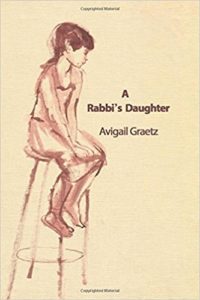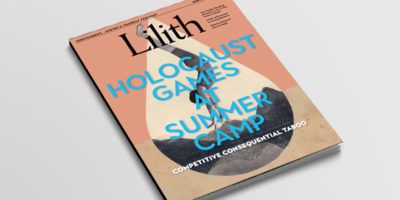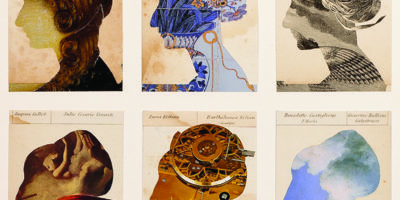A Long Lineage of Rabbis’ Daughters in Fiction
 This first novel by Avigail Graetz is tellingly titled A Rabbi’s Daughter ($15) and not The Rabbi’s Daughter. At first I thought the title was poorly translated—this novel was originally published in Hebrew in 2012 (the English version is self published)—but soon it became clear that the author regards her heroine as yet another rabbi’s daughter in a long tradition of fictional works about rabbis’ daughters in modern Hebrew literature, by authors such as Shaul Tchernichosvsky, Jacob Steinberg and Devora Baron. Of course, stories about rabbis’ daughters go back at least as far as the second-century Talmudic figure of Beruria, the wife of Rabbi Hanina ben Teradion (according to some traditions), and include recent novels by Rebecca Goldstein, Reva Mann, Maggie Anton, and a recent Israeli documentary by Racheli Wasserman. And so it would be fair to say that Graetz’s heroine, Elisheva Levy, has good yichus (lineage).
This first novel by Avigail Graetz is tellingly titled A Rabbi’s Daughter ($15) and not The Rabbi’s Daughter. At first I thought the title was poorly translated—this novel was originally published in Hebrew in 2012 (the English version is self published)—but soon it became clear that the author regards her heroine as yet another rabbi’s daughter in a long tradition of fictional works about rabbis’ daughters in modern Hebrew literature, by authors such as Shaul Tchernichosvsky, Jacob Steinberg and Devora Baron. Of course, stories about rabbis’ daughters go back at least as far as the second-century Talmudic figure of Beruria, the wife of Rabbi Hanina ben Teradion (according to some traditions), and include recent novels by Rebecca Goldstein, Reva Mann, Maggie Anton, and a recent Israeli documentary by Racheli Wasserman. And so it would be fair to say that Graetz’s heroine, Elisheva Levy, has good yichus (lineage).
The novel (translated by Shira Atik) opens when Elisheva’s father notifies her of her grandmother’s imminent death and summons her to “come home,” a phrase that takes on increasing significance as it becomes clear just how far Elisheva has drifted from her parents’ home in her thinking and in her choices. The novel then pivots to describe a significant homecoming that the author recollects from her teenage years, when a mysterious woman named Amy came to their home in Beersheva. Amy, who wears a hippocampus pendant around her neck, identifies herself as a rabbi’s wife and a child psychologist who has arrived in Israel to do research on childhood trauma. She takes up residence in their spare bedroom and arouses increasing suspicion from Amy and her father, Rabbi Levy, until ultimately they must ask her to leave.
Rabbi Levy, who “really did know everything, except, as it turned out, when it concerned his own family members,” is somewhat of a local celebrity. “The way Americans talked about him made my father sound as important as David Ben-Gurion.” A Nebraskan native, he made aliyah with his wife, Ruth, after the Six Day War and brought the Conservative movement to Israel—“miraculously,” Elisheva tells us, as if he made the desert bloom. This metaphor may very well be apt, given how hard it has been for a non-indigenous species like Conservative Judaism to take root in Israeli soil. Their home is always open to visitors, especially American rabbis and their families. In this sense it is like Abraham’s tent in the desert, and indeed this novel is sprinkled with biblical allusions on nearly every page—both because Elisheva is studying for her high school matriculation exam in Bible when Amy arrives, and because Amy is a practitioner of “bibliodrama,” acting out biblical scenes to convey their full force. In one of the novel’s more memorable scenes, she plays the part of Tamar, who is raped by her half-brother Amnon, a performance which Elisheva compares to the “famous fake-orgasm scene in When Harry Met Sally.” Elisheva is quick to inform Amy that Bible is her least favorite subject, to which Amy responds: “You’re not the first rabbi’s daughter, and certainly not the last, who hates Bible.”
Another biblical allusion that plays a key role in this novel is the commandment to send away the mother bird before taking the young. Elisheva’s mother, also a psychologist, is notably absent in both the book’s present and in its flashback scenes from Amy’s visit, and, we are told, she was also traveling during the Gulf War. There is rarely home-cooked food in their fridge, and when Amy arrives, Elisheva and her father order pizza to entertain her. In a promotional video about her novel, Graetz explains that her grandmother died when she was young, and so perhaps the figure of the absent mother—as well as the grandmother’s death, which looms so large—is Graetz’s way of playing out this loss.
Certainly the autobiographical element is very strong in this novel. Graetz herself is the daughter of a Conservative rabbi in Beersheva and she, like her heroine, went on to become a filmmaker. Though it is only Graetz who becomes an author as well. In her acknowledgements she notes that her brother marveled she was able to write a novel out of their “boring life,” and here too, it seems, she has made the desert bloom.
Ilana Kurshan‘s new book is If All the Seas Were Ink: A Memoir.



